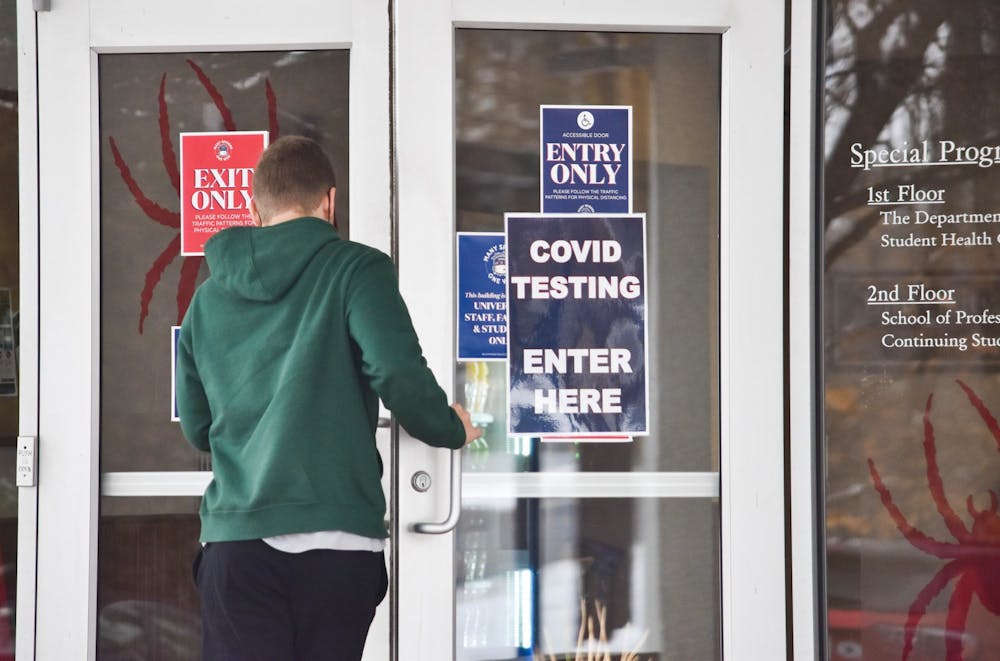The Jan. 25 discovery of a new, rapidly spreading strain of the virus in a Northern Virginia resident who reported no recent history of travel has raised some concerns among University of Richmond students. But methods to prevent the new strain's spread remain similar to those used against the original virus.
The new virus variant, known as the B.1.1.7 variant, was first identified in the United Kingdom in late 2020 and is more contagious than the original strain of the virus, according to the Virginia Department of Health. The variant spreads between people at a faster rate than other strains currently spreading,Eugene Wu, UR professor of biology and biochemistry, said.
“The virus that causes COVID-19 has been circulating around the world for over a year now," Wu said. “As it infects one person after another, each chance it replicates, it gets a chance to mutate.
"The number of mutations has accumulated over time. Each month more and more mutations pop up, and each of these mutations can be thought of as a new variant of the virus.”
Wu said overall, the B.1.1.7 corona virus strain is 50 to 75 percent more contagious than the original variant.
Wu, who specializes in studying the adenovirus, which like the COVID-19 virus causes upper respiratory infections, said one of the real successes since the beginning of the pandemic has been the rapid development of vaccines against COVID-19.
Although the B.1.1.7 variant is a new strain of the COVID-19 virus, there have been studies conducted that prove that current COVID-19 vaccines can help protect against this variation, Wu said.
“The team of scientists that invented the Moderna vaccine against coronavirus has already done studies, taking the blood of volunteers [who] have been vaccinated and [testing] the blood and their antibodies against new variants," Wu said. The team found that the volunteers' blood samples, which contained the vaccine, could neutralize the new variants of coronavirus, Wu said.
An Instagram account run by junior Caterina Erdas, UR Web Warriors, aims to provide the UR student body with up-to-date information on COVID-19 spread and prevention both on and off campus.
Erdas said that although the B.1.1.7 COVID-19 strain landing in Virginia could be alarming for students, UR was currently doing as much as it could and should be doing to prevent the virus on campus.
“From what I’ve seen, I think one of the main parts of preventing the virus is mask-wearing and socially distancing and trying not to go into big gatherings,” Erdas said. “I think the mask-wearing part -- the student body has gotten really good at that and has incorporated that into their daily routine.”
Although UR is taking preventative measures against all variants of the virus, senior Emma Spinale said she was going to take further precautions now that the B.1.1.7 strain had hit Virginia because she was worried it would spread to UR.
Enjoy what you're reading?
Signup for our newsletter
"I’ve heard that it’s a lot more contagious, which definitely makes me more nervous doing things that I wouldn’t have thought twice about last semester," Spinale said. "I am nervous about getting it but also don’t want to spread it to my professors or the larger Richmond community. So I feel a greater responsibility, which can be stressful."
The University of Richmond has taken numerous precautions to prevent the spread of COVID-19 this semester, but still saw spikes in cases in January.
Wu said avoiding social gatherings, with and without masks, is the best way to slow the spread of any variant of the virus.
“That’s the only thing I can really emphasize right now," he said. "New variant or not, that’s the same thing I would say to anybody."
Contact news writer Liv Ronca at liv.ronca@richmond.edu.
Support independent student media
You can make a tax-deductible donation by clicking the button below, which takes you to our secure PayPal account. The page is set up to receive contributions in whatever amount you designate. We look forward to using the money we raise to further our mission of providing honest and accurate information to students, faculty, staff, alumni and others in the general public.
Donate Now



